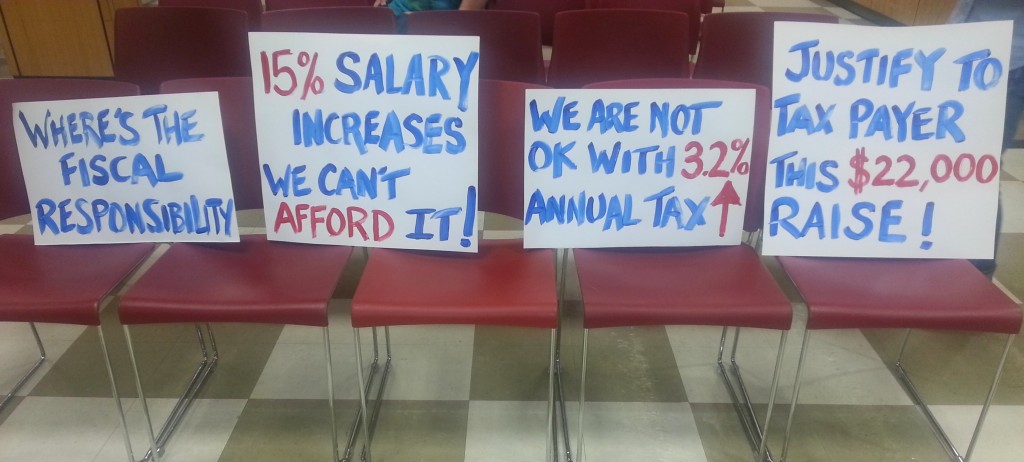Not all is equal. In the T/E School District, some workers enjoy equitable treatment and benefits while others do not. This is the story about the aides and paraeducators, the District’s lowest paid employees, their collective bargaining efforts and the questionable behavior of those trying to derail the process.
Most of you reading this post will have no idea what I am talking about or what has been going on with the District’s aides and paras since January of this year. My association with the aides and paras began last year with the District’s outsourcing threat over the Affordable Care Act and has continued during the collective bargaining process of the last five months.
At the request of Ruthann Waldie, UniServe representative for PSEA (Pennsylvania State Educational Association), I have not written about this matter until today. Early on, Ruthann told me that the collective bargaining process for the TE aides and paras was ‘fragile’ and if the effort were to succeed she suggested that I not write about it on Community Matters. I trusted her experienced wisdom and complied. However, during the last 72 hours, circumstances have dramatically changed that make it no longer possible to remain silent.
Before explaining the recent actions in the collective bargaining process, it is important to understand the timeline and review the details.
In 2013, after a very loud public outcry, the jobs of the District aides and paraeducators were saved from outsourcing – however, for only one year, the 2013-14 school year. At that time, there was talk among some of the aides and paras about forming a collective bargaining unit but once the school board agreed not to outsource (and to keep their hours intact), the discussion on the subject lessened. However, things heated up again when these employees received a threatening, demeaning memo from Sue Tiede, (the former TESD Personnel Director), in January of this year. Her communication established the 7-minute check-in and check-out policy for the aides and paras, and detailed the progressive discipline measures for violation, including suspension.
Tiede’s message represented a continuing trend of disrespect and intimidation directed at the aides and paras. Growing concern returned about possible outsourcing and … with that concern, a sense of urgency among the aides and paras developed. Unfortunately, many of the aides and paras continue to feel undervalued and unappreciated by the administration and references such as ‘disposable’ by at least one school board member have done little to improve their morale.
Without representation by a collective bargaining group, the District’s aides and paras are powerless; their continued employment is solely at the mercy of the T/E School District’s Superintendent and School Board. As a result, a small group of determined, dedicated aides and paras came together in early February to discuss options and plot a course of action to improve their working conditions.
According to Ruthann Waldie, PSEA representative, the aides and paras could not join the District’s teachers union because they were not considered ‘instructional’ employees. Furthermore, Ruthann explained that due to a law change five years ago, the aides and paras were prohibited from forming their own ‘new’ union when a qualifying union already existed. As explained, TENIG (Tredyffrin Easttown Non-Instructional Group) the District’s qualifying union with non-instructional employees and therefore, the aides and paras would become part of that group.
Before the collective bargaining campaign was officially underway, I spoke with TENIG president, Mary Minicozzi to ask her opinion about adding the 176 District aides and paras to their union. Her reaction was overwhelmingly supportive, stating that she was 110% in favor. I invited her to attend the upcoming organizational meeting with all the District aides and paras and PSEA representatives. Mary confirmed that she would attend the meeting and that she would ask fellow TENIG members to also attend. However, something happened between that phone conversation and the organizational meeting a few days later. Mary did not attend the meeting nor did anyone else from TENIG attend. To my knowledge, she has had no further contact with any of the aides and paras since that point.
Over the course of the following four months, we learned through PSEA representatives, that Mary was no longer supporting the idea of the aides and paras joining TENIG, although it remained unclear as to why. However, the PSEA representatives continued to tell the aides and paras that it did not matter because the law required them to join TENIG.
The organizing campaign for the aides and paras continued to move forward. On February 21, the T/E School District and the School Board received official notification regarding the aides and paras interest in collective bargaining. Once notified of the organizing campaign, the PA Public Employee Relations Act 195 protected the aides and paras from any interference, threats, harassment, reprisals, etc. from the District during the process. (Or so we thought).
The T/E School Board hired solicitor Jeffrey Sultanik of Fox Rothschild, LLP to represent the District in the aides/paras collective bargaining process. As an experienced labor relations attorney and school district contract negotiator, it is clear that Sultanik counseled school board members against interfering in any way with the aides and paras in the unionizing process. As their legal counsel, Sultanik would have explained the liability issues to the District if tampering occurred in the collective bargaining process. Likewise, that same warning would have applied to all District administrators, including the superintendent.
Before the Pennsylvania Labor Relations Board (PLRB) in Harrisburg will schedule an election, there must be a suitable showing of interest by the employees in forming a union. PLRB requires a minimum of 30% of the effected bargaining unit employees to show interest by the signing of a ‘union assignment card’. The card does not indicate whether you would vote for or against a union – the signature simply signifies that you are in interested in moving the process forward and that you desire the appropriate local union (in this case the PSEA) to represent you for the purpose of collective bargaining. However, we learned that PSEA’s policy was to have at least 60% of the eligible employees sign the cards as an indicator of their commitment to the bargaining process.
As the campaign progressed, aides and paras from the eight District schools showed support for the collective bargaining process by signing the cards. (Due to years of intimidation and low morale issues in the District, the process however, was very slow.) In early May, after receiving 94 signed commitment cards, the PSEA representatives filed with the PA Labor Relations Board for an election for the aides and paras to join TENIG.
Upon approving the collective bargaining application, the PLRB was to set up a conference call between (1) the PSEA representatives, (2) the School District representatives and (3) the PA Labor Relations Board. The purpose of the conference call determines all the rules and details around the election and sets the date for the actual election.
The aide and paras hoped that if the conference call occurred by early June, PLRB would schedule the election for before June 20, the last day of the 2013-14 school year. To vote in the election, you must be an eligible employee. All 176 aides and paras are eligible to vote (whether they signed the commitment card or not). TENIG members are not eligible to vote. The PLRB requires that the union receive 50% + 1 votes of all employees who cast ballots. (Example: if only 10 eligible employees showed up to vote, the count needs to be six voting yes).
Unfortunately, the scheduled conference call between the Labor Relations Board, PSEA and the School District was delayed until June 18, which in turn pushed the election to September, after school starts. Although the aides and paras were disappointed to learn of the election delay, they had fought an uphill battle to come this far and remained committed to staying the course.
Then the unthinkable occurred this past Thursday, June 5 … the reason for this post. A pre-selected group of 6-8 aides and paras received word in a PSEA conference call that their collective bargaining application would be withdrawn from the PA Labor Relations Board. Why? Because Mary Minicozzi, president of TENIG, did not want the 176 aides and paras in her union. During the call, the PSEA representative further stated that the aides and paras would now need to start the campaign process all over again to form their ‘own’ union in the District.
By early Friday morning, as aides and paras learned the news, accusations of impropriety, collusion and tampering in the collective bargaining process began to surface. Interestingly, members of TENIG were also seeking answers. Evidentially there was no official discussion with the TENIG members about the aides and the paras joining their union nor was a vote taken by the TENIG members. It would appear that the president of TENIG, Mary Minicozzi made this unilateral decision on her own to exclude the aides and paras from joining TENIG. (Remember, this same individual personally told me four months before that she “110 percent supported” their inclusion!)
Many TENIG members have worked together with the aides and paras in the T/E School District for years. The aides and the paras are their fellow District employees and TENIG workers know all too well, what it is like to be the target of the school districts’ outsourcing ax. It seems highly unlikely that if the issue had come to a vote, that the TENIG members would have voted against including the aides and paras. Why would they? Adding 176 more employees to TENIG would increase their collective bargaining group to over 300 members.
And let’s not forget that PSEA’s Ruthann Waldie told the aides and paras from the start that ‘legally’ they had to be in TENIG – as she explained, it was their only option. She had further indicated that because it was the law, it did not matter whether TENIG wanted them or not.
The PA Labor Relations Board has already fielded calls from the District aides, paras and even TENIG members demanding answers – and some have already reached out to attorneys.
How is it possible that the TENIG president can control the future of 176 aides and paras in the T/E School District? If Mary didn’t involve her fellow TENIG members in the decision-making process, exactly who was involved. I find it impossible to believe that she acted completely on her own. It makes no sense — Why would you not include 176 additional workers in a union; adding the aides and paras would increase TENIG’s collective bargaining group to over 300 members strong!
We know that Mary’s decision was not based on an impending TENIG contract. If you recall, Mary signed a new TENIG contract in September 2013, 9 months before the existing contract was set to expire. The new 3-year TENIG contract begins July 1, 2014 and goes to June 30, 2017. I will not believe that Mary Minicozzi made this decision on her own – what did she have to gain? Was there a promise of something in exchange?
Why did Ruthann Waldie repeatedly tell the aides and paras that the law required them to join TENIG when this week the story changes and now are told they must form their own union? Things just don’t add up. It reminds me of the line from Shakespeare’s Hamlet, “Somethings rotten in Denmark”.
Section 1201, Article XII, Unfair Practices of the Public Employee Relations Act states that public employers, their agents or representatives are prohibited from engaging in ‘unfair labor practices’. As defined by Public Employee Relations Act, unfair labor practices include a couple of relevant sections: (1) Interfering, restraining or coercing employees in the exercise of the rights under Act 195 and (2) Dominating or interfering with the formation, existence or administration of an employee organization.
We know that interference has occurred in the collective bargaining process of the aides and paraeducators of the TE School District. At the ninth hour, the collective bargaining process was derailed. Why would anyone risk the legal ramifications of tampering with the process? Who is involved and why? Did the president of TENIG act alone or was she coerced? Did the Superintendent, the School Board or the District Solicitor know what was going on?
For the record, as of Friday, June 6, an attorney at the PA Labor Relations Board reported that the aides and paras collective bargaining file remains open and their application active. By exposing the interference in the collective bargaining process, maybe there is a chance that this situation can ‘right itself’ and continue to move forward with the June 18 conference call and a September election to join TENIG. The District aides and paras have earned this right.
The T/E School Board has a fiduciary responsibility to those who have elected them to serve as advocates and stewards of our school district. I do not want to believe that any member of the School Board was involved nor had any knowledge of the derailment of the collective bargaining process of the aides and paras. With accusations of interference, tampering, collusion, misconduct, etc. swirling, the Board needs to act quickly. I suggest an internal examination to figure out ‘who’ knew ‘what’ and ‘when’. The PA Labor Relations Board may deem there is sufficient evidence to conduct their own investigation and if I were T/E School Board directors, I would want to be out in front of such an investigation not behind it.

 l Barn – and serve as the ‘Living History Center at Duportail’ in Chesterbrook.
l Barn – and serve as the ‘Living History Center at Duportail’ in Chesterbrook.

